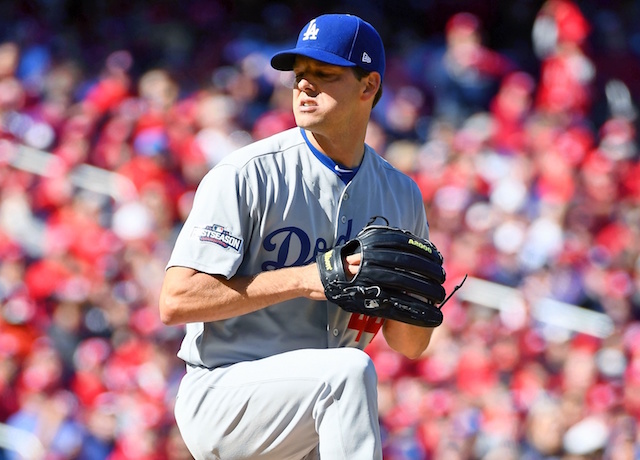Arguably the best starting pitching on the free agent market came off the board when the Winter Meetings began, as the Los Angeles Dodgers announced the re-signing of Rich Hill to a three-year, $48 million contract.
The deal equals the largest Andrew Friedman has doled out in his tenure as Dodgers president of baseball operations. Brandon McCarthy (four years) and Scott Kazmir (three years) also signed for $48 million.
Hill’s signing of the first long-term contract of his career made for an emotional press conference. He was out of the Majors completely in 2015, until pitching well enough in the Independent League to catch on with the Boston Red Sox that September.
Heading into free agency there was some doubt whether the Dodgers would re-sign the veteran left-hander, particularly with Kenley Jansen and Justin Turner also hitting the open market.
On top of a bidding war never quite breaking out for Hill, the Dodgers’ efforts for a reunion were aided by backloading the three-year contract, via the Associated Press:
Hills gets a $2 million signing bonus and salaries of $12 million next year, $16 million in 2018 and $18 million in 2019.
At the time of being acquired from the Oakland Athletics prior to the non-waiver trade deadline in August, Hill was 9-3 with a 2.25 ERA, 2.53 FIP and 1.09 WHIP. He led American League pitchers (minimum 75 innings) in ERA and home runs allowed per nine innings (0.24).
The 36-year-old went 3-2 with a 1.83 ERA in six starts with the Dodgers. Overall in 2016, Hill was 12-5 with a 2.12 ERA, 2.39 FIP and 0.99 WHIP in 20 starts. He went 1-1 with a combined 3.46 ERA in three postseason starts, one of which came on short rest — a first for Hill in his career.
Hill’s final postseason outing was a gem, as he tossed six shutout innings to defeat his former team, the Chicago Cubs, to give the Dodgers a 2-1 lead in the National League Championship Series.
Hill dealt with some blister issues this year, but said those troubles are behind him and should not be a problem moving forward. He will likely again be the Dodgers’ No. 2 starter behind Clayton Kershaw in 2017.
On top of continuing to field a competitive team, the Dodgers face the challenge of further trimming their payroll to avoid significant luxury tax penalties under the new collective bargaining agreement, making Hill’s contract structure all the more imperative.






